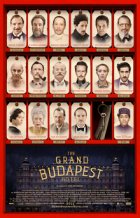
The Grand Budapest Hotel
EXT. CEMETERY. DAY
The present. A graveyard in the city-center of a greatEastern European capital. Frost covers the ground amongthe stones and between rows of leafless trees. A
teenaged girl in a beret and trench-coat with a well-
read, dog-eared novel called THE GRAND BUDAPEST HOTELtucked under her arm stands facing a tarnished bust of aslender, balding, spectacled old man. A bronze plaquebelow reads, in large letters:
AUTHOR:
INSERT:
The plaque. There is a block of smaller text at thebottom which states simply:
In Memory of Our National Treasure
All around the base of the statue, there are littlemetal hooks with hundreds of hotel-room keys of everyage and variety from all over the world hanging fromthem. The girl adds a new set to the tribute.
INT. STUDY. DAY
Twenty years ago. A cluttered office with French windowsand ornate mouldings. There are books in shelves andstacks, first editions, dictionaries, dime-store paperbacks,
translations in numerous languages. There is atypewriter on the desk and an extensive collection ofliterary prizes on a bureau.
The author, seventy-five and identical to his sculptedimage, sits with his hands clasped and addresses thecamera:
AUTHOR:
It is an extremely common mistake: peoplethink the writer’s imagination is alwaysat work, that he is constantly inventingan endless supply of incidents andepisodes, that he simply dreams-up hisstories out of thin air. In point offact, the opposite is true. Once thepublic knows you are a writer, they bringthe characters and events to you -- and
as long as you maintain your ability tolook and carefully listen, these storieswill continue to seek you out -
A six-year-old boy dressed in a grey military uniformwith short trousers appears next to the desk and pointsa miniature Luger pistol at the author. The author warnshim, icy:
2.
AUTHOR:
Don’t do it. Don’t!
The boy hesitates, then fires. A yellow, plastic pelletricochets off the author’s chest and rings against awhiskey glass as the author makes a violent lunge forthe boy -- who evades him and dashes off. The authorlooks at a note-card and rambles a bit, searching forhis place:
AUTHOR:
Over your lifetime. I can’t tell you howmany times. Somebody comes up to me.
(back on track)
To him who has often told the tales of
others, many tales will be told.
The boy returns, the gun now tucked under his belt, andsits, immediately comfortable, on the author’s lap withthe old man’s arms wrapped around his shoulders. Theconflict seems never to have existed. They both lookinto the camera as the author concludes:
AUTHOR:
The incidents that follow were described
to me exactly as I present them here, andin a wholly unexpected way.
EXT. MOUNTAIN RANGE. DAY
The late sixties. A stunning view from a rusty, iron-
lattice terrace suspended over a deep crevasse, greenand lush, alongside a high cascade. The author continuesin voice-over as the camera glides along a cracked paththrough a plot of untamed edelweiss and buttercups:
AUTHOR (V.O.)
A number of years ago, while sufferingfrom a mild case of “Scribe’s Fever” (aform of neurasthenia common among theintelligentsia of that time) I haddecided to spend the month of August inthe spa town of Nebelsbad below theAlpine Sudetenwaltz -- and had taken uprooms in the Grand Budapest -
The camera comes to a stop as it reveals a sprawlingnineteenth-century hotel and baths situated on a wideplateau. There is a deep, formidable staircase up to aregal entrance. There is a promenade above and a glass-
panelled conservatory below. A rickety funicular groansas it slowly climbs its hillside tracks. The grass needscutting, the roof needs patching, and more or less everysurface of the building needs a coat of paint.
3.
AUTHOR (V.O.)
-- a picturesque, elaborate, and oncewidely-celebrated establishment. I expectsome of you will know it. It was offseason
and, by that time, decidedly out-
of-fashion; and it had already begun itsdescent into shabbiness and eventual
demolition.
MONTAGE:
The nine other guests of the hotel each observed from arespectful distance: a frail student; a fat businessman;
a burly hiker with a St. Bernard; a schoolteacher withher hair in a bun; a doctor; a lawyer; an actor; and so
on.
AUTHOR (V.O.)
What few guests we were had quickly cometo recognize one another by sight as theonly living souls residing in the vastestablishment -- although I do notbelieve any acquaintance among our numberhad proceeded beyond the polite nods weexchanged as we passed in the Palm Courtand the Arabian Baths and onboard the
Colonnade Funicular. We were a veryreserved group, it seemed -- and, withoutexception, solitary.
CUT TO:
An enormous, half-abandoned dining room. There are twohundred tables and fifty chandeliers. The ten guestssit, each on his or her own, at their separate tables,
widely-spaced across the giant restaurant. A waitercarries a tray a great distance to the schoolteacher andserves her a plate of peas.
INT. LOBBY. EVENING
There are faded couches, fraying armchairs, and coffeetables with new, plastic tops. The carpets arethreadbare, and the lighting in each area is either toodim or too bright. A concierge with a crooked nosesmokes a cigarette as he lingers behind his desk. He is
M. Jean.
(NOTE:
the staff of the hotel in both the relevant time-periods wear similar versions of the same purple uniform-- while the public spaces reflect a cycle of “regimechanges”.)
On the wall behind M. Jean, there is a beautiful,
Flemish painting of a pale, young boy holding a piece ofgolden fruit. This is “Boy with Apple”. A patch of water
4.
damage above seeps dangerously close to the picture-
frame.
The author (a fictionalized version of himself) wandersinto the room with his hands in his pockets. He has darkcircles under his eyes.
AUTHOR (V.O.)
Perhaps as a result of this generalsilence, I had established a casual andbantering familiarity with the hotel’sconcierge, a West-continental known onlyas M. Jean, who struck one as being, atonce, both lazy and, really, quiteaccommodating.
M. Jean quickly stubs out his cigarette as the authorapproaches -- and tucks the butt into his coat pocket.
AUTHOR (V.O.)
I expect he was not well-paid.
The author and M. Jean chat amicably as they study apamphlet of Alpine tourist sites.
AUTHOR (V.O.)
In any case, one evening, as I stoodconferring elbow-to-elbow with M. Jean,
as had become my habit, I noticed a newpresence in our company.
At the far end of a colonnade, beyond Reception, a dark-
skinned, white-haired seventy-year-old man in a threepiece-
suit sits alone smoking a pipe. He is Mr. Moustafa.
AUTHOR (V.O.)
A small, elderly man, smartly dressed,
with an exceptionally lively, intelligentface -- and an immediately perceptibleair of sadness. He was, like the rest ofus, alone -- but also, I must say, he wasthe first that struck one as being,
deeply and truly, lonely. (A symptom ofmy own medical condition, as well.)
Mr. Moustafa drinks a sip of sherry. The author lowershis voice and asks discreetly:
Translation
Translate and read this script in other languages:
Select another language:
- - Select -
- 简体中文 (Chinese - Simplified)
- 繁體中文 (Chinese - Traditional)
- Español (Spanish)
- Esperanto (Esperanto)
- 日本語 (Japanese)
- Português (Portuguese)
- Deutsch (German)
- العربية (Arabic)
- Français (French)
- Русский (Russian)
- ಕನ್ನಡ (Kannada)
- 한국어 (Korean)
- עברית (Hebrew)
- Gaeilge (Irish)
- Українська (Ukrainian)
- اردو (Urdu)
- Magyar (Hungarian)
- मानक हिन्दी (Hindi)
- Indonesia (Indonesian)
- Italiano (Italian)
- தமிழ் (Tamil)
- Türkçe (Turkish)
- తెలుగు (Telugu)
- ภาษาไทย (Thai)
- Tiếng Việt (Vietnamese)
- Čeština (Czech)
- Polski (Polish)
- Bahasa Indonesia (Indonesian)
- Românește (Romanian)
- Nederlands (Dutch)
- Ελληνικά (Greek)
- Latinum (Latin)
- Svenska (Swedish)
- Dansk (Danish)
- Suomi (Finnish)
- فارسی (Persian)
- ייִדיש (Yiddish)
- հայերեն (Armenian)
- Norsk (Norwegian)
- English (English)
Citation
Use the citation below to add this screenplay to your bibliography:
Style:MLAChicagoAPA
"The Grand Budapest Hotel" Scripts.com. STANDS4 LLC, 2025. Web. 21 Feb. 2025. <https://www.scripts.com/script/the_grand_budapest_hotel_587>.







Discuss this script with the community:
Report Comment
We're doing our best to make sure our content is useful, accurate and safe.
If by any chance you spot an inappropriate comment while navigating through our website please use this form to let us know, and we'll take care of it shortly.
Attachment
You need to be logged in to favorite.
Log In